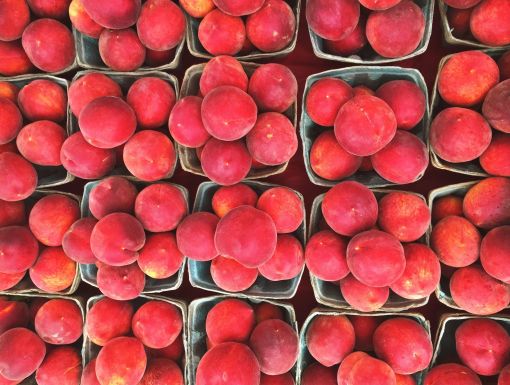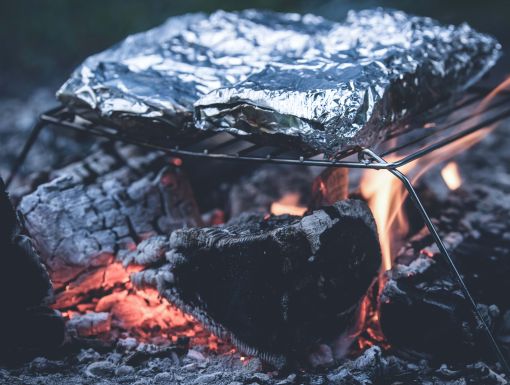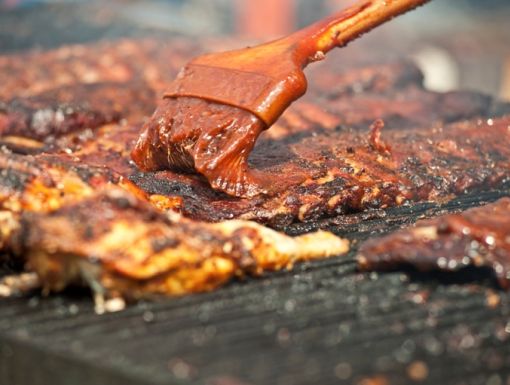
What Are the Safety Precautions for Grilling? 5 Top Tips
Grilling season is ramping up, if not already in full swing! Whether you're a seasoned pro or new to backyard barbecues, proper preparation and safe grilling practices can make all the difference for a successful cookout. From setting up your grill station to preventing burns and avoiding food contamination, we've got you covered with essential grill safety tips.
How should you prep your grill safely?
A safe and successful grilling experience starts with proper setup. Here are five tips on how to grill safely:
- Can I use my grill indoors or in a garage? No. Never use a grill indoors or in a garage. Grills release carbon monoxide, a colorless and odorless gas that is harmful or potentially deadly if inhaled in enclosed spaces. Always grill outdoors in a well-ventilated area.
- How far should I position my grill from structures or trees? Always place your grill a safe distance away from your home, deck railings and overhanging branches. This reduces the risk of fire spreading to nearby structures or foliage, keeping your grilling area secure and safe.
- How can I make sure my grill is stable? Double-check that your grill is assembled correctly and on a flat, stable surface before use. This prevents it from tipping over and reduces the risk of accidents during grilling.
- Why is it important to clean your grill regularly? A clean grill helps prevent grease buildup, which can lead to dangerous flare-ups during cooking.
- What can I use to control a grease fire while grilling? Know how to shut off the fuel source immediately. Always have a fire extinguisher nearby for emergencies. If you don't have one, keep a bucket of sand or baking soda nearby to quickly and effectively extinguish grease fires. Never use water on grease fires; it can make the flames spread. If things get out of hand, get away and call 911.
Should I clean my grill before use?
You should clean grill grates before cooking to remove old food residue and bacteria. However, be aware that metal bristles can break off and become lodged in the grill. If ingested, these bristles can cause serious injuries. Inspect your grill carefully after cleaning and consider alternatives:
- Nylon brushes designed for grills
- Grill stones or scrapers
- Aluminum foil scrunched into a ball for cleaning
How do you prevent cross-contamination while grilling?
Once the grill is fired up, it's essential to prevent the risk of food poisoning through cross-contamination. This happens when juices from raw meat come into contact with cooked food or other surfaces. Common symptoms of food poisoning include nausea or vomiting, abdominal pain, diarrhea and fever. To avoid cross-contamination while grilling, follow these tips:
- Wash your hands with soap and water before and after handling raw meat.
- Use separate cutting boards, plates, and utensils for raw and cooked foods to avoid cross-contamination.
- Grill one type of meat at a time.
- Clean all utensils during and after grilling.
- Anything that comes into contact with raw meat shouldn't come into contact with cooked foods. That includes the marinade!
- Cook foods to the proper temperature. You should use a food thermometer.
- Do not leave perishable food out in warm temperatures for extended periods.
Hydrate, hydrate, hydrate! Grilling outdoors in hot weather can lead to dehydration quickly, so it's essential to drink plenty of water throughout the day while grilling and eating. Be sure to offer your guests water or electrolyte drinks to help them stay hydrated as well. Proper hydration supports digestion and overall safety.
How to avoid burns while grilling
Grills get incredibly hot and can pose serious burn risks if proper precautions aren't taken. Explore the answers to some common grill questions that could lead to burns:
- Is it safe to leave the grill unattended? No. Fires can spread quickly, and leaving the grill increases the risk of accidents.
- How do you safely light a gas grill? Open the lid before lighting to avoid gas buildup, then light the grill according to the manufacturer's instructions, using either the ignition switch or a grill lighter.
- Should I use long-handled utensils when grilling? Yes. Long-handled utensils help you stay a safe distance from the heat and prevent burns from splatters or flare-ups.
- What type of mitts should I use when grilling? Use flame-retardant mitts designed for grilling. These provide a better grip and protect your hands from burns when handling hot grill parts.
- Is it safe to move a hot grill? Never move a hot grill. It's easy to stumble or drop, which could lead to severe burns or other injuries.
- How far should children and pets be kept from the grill? Always maintain a safe zone of at least five feet around the grill to prevent accidents. Having a sober adult present to supervise children can help you focus on the grill and being safe.
How should you handle burn injuries?
No matter how careful you are, accidents can happen. If a burn occurs, follow these four steps to provide immediate care:
- Cool the burn immediately under cool (not cold) running water for 10 to 15 minutes to reduce swelling and clean the area surrounding the injury that the bandage will cover.
- Remove jewelry or tight clothing near the burn (before swelling starts, if possible, and if not stuck).
- Inspect the burns and cover minor ones loosely with a clean, non-stick bandage or cloth.
- Keep it clean and dry.
A common misconception is that applying ice to the affected area is beneficial. However, avoid doing so, as ice can slow blood flow and potentially damage tissue.
When should you seek medical attention after a burn?
Visit urgent care if the burn meets any of these criteria:
- It affects the face, hands, feet, genitals, fingers or over joints.
- It covers a large area or appears to be deep.
- Signs of infection are present, such as redness, pus or a fever above 100.4°F.
- Cloth is stuck to the burned skin (do not attempt to remove it yourself).
Are you ready to grill like a pro?
Grilling is fun and flavorful when the proper safety precautions are met. By following these safe grilling practices, you can master the art of grilling while protecting yourself and your loved ones from accidents.
If you or someone else needs medical care after a grilling injury, find the nearest urgent care location here.



